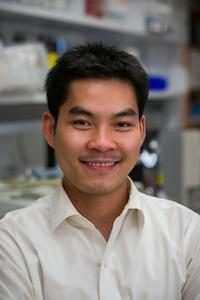Doan Dao – Postdoctoral Research Fellow Award

Research is integral to the work of the American Liver Foundation and is essential to finding new ways to prevent, treat and cure liver disease. Supporting early-career scientists is critical to this effort. In 2014, the American Liver Foundation provided funding to 11 early-career scientists from some of the nation’s leading academic institutions who are making the study of liver disease their life’s work. These researchers are contributing to the knowledge of how liver diseases develop and progress. Their discoveries may one day go beyond the laboratories and into clinical practice, aiding in drug development and other interventions that will ensure the health of millions of Americans.
ALF Hepatitis Fund for the Cure Postdoctoral Research Fellowship Recipient:
Doan Dao, MD
University of Texas Southwestern Medical Center and Chairman, National Task Force on Hepatitis B: Focus on Asian Pacific Islander Americans (hepbtaskforce.org)
Postdoctoral Research Fellow
The Centers for Disease Control and Prevention (CDC) reports that between 800,000 and 1.4 million people in the United States are living with hepatitis B and 240 million people are living with the virus globally. Each year in the U.S., approximately 800 newborns are chronically infected due to mother-to-infant exposure. And, according to the CDC, without immunization to protect against hepatitis B, 40% of infants born to infected mothers in the United States will develop chronic hepatitis B infection. Approximately 25% of that number will eventually die from chronic liver disease.
Research has shown that hepatitis B acquired in early childhood leads to an “immune tolerance” phase that can last for decades. In fact, the younger the age at which hepatitis B is acquired, the more likely that the virus will be present at very high levels and not be removed from the body by the immune system.
Despite this, infected children may show little or no symptoms until much later in life, and, at that point, their long exposure to the virus makes them more likely to suffer dire conditions such as liver failure and liver cancer.
Dr. Dao’s research will focus on a particular type of immune cell called regulatory T cells to determine the differences these cells play in children and in adults that may explain why children develop long-standing infections more frequently than their older counterparts.
Dr. Dao hopes that findings from his research will enhance knowledge about the underlying immunological mechanisms in hepatitis B-tolerant patients that could pave the way for the development of new therapeutic strategies to treat and cure the tolerance that leads to chronic, lifelong infection.
Last Updated on November 9, 2017
Share this page





